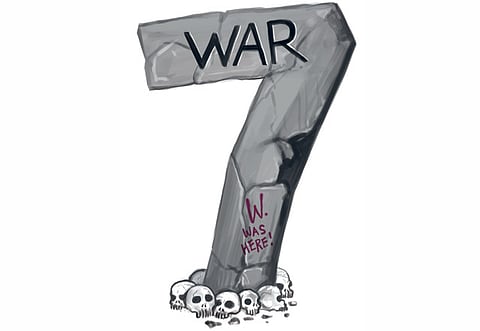History will never justify Iraq invasion
Verdict of future generations cannot condone brutal actions in the past

History will decide, say people airily. Of course, history will do no such thing. What they mean to say is that historians of the future will judge the times we live in and make all manner of assumptions on the basis that events can be seen clearer from a distance.
But the wisdom of people who have not been born seems questionable to me because I can never entirely believe that they will match what we know of our own time. It's not an iron rule, naturally, but deferring to people of the future to decide whether something is right or wrong, a ghastly error of judgement or sublime inspiration, seems to me be misguided. History selects and sifts and ends up relegating such things as human suffering to the incidental file.
Take the bodies of 55 Vikings aged between 17 and 25 dug up near Weymouth recently. The young men had been decapitated by Anglo Saxons, possibly in the St Brice's Day massacre in 1002, when Ethelred the Unready broke a truce and ordered his troops to massacre any Vikings they could find.
What today's historians see in this hasty burial is evidence of an event that led to mass reprisals by Scandinavians and the eventual Viking conquest of Britain in 1013.
Pain and death suffered by people become less important as time moves on, and that is significant when we come to think about the Iraq war, launched seven years ago this month.
Already there is competition for the ear of future historians and there is an attempt under way to fix the record of the actual number of people killed because of the invasion. Little by little the grim reaper is being edited out of the footage.
In 2006, a team of American and Iraqi public officials claimed that up to 600,000 people had been killed in the invasion. The figures have been revised down and sometimes up. In last week's Financial Times, Nigel Biggar, regius professor of moral and pastoral theology at Oxford, wrote: "As proof of the Iraq invasion's wickedness, critics invoke the civilian death toll, soberly reckoned at 100,000-150,000."
With a toll of 600,000 it's a lot less easy to balance the ethical books and argue that it "was really necessary to prevent a sufficiently great evil".
Since the Iraqi elections on Sunday, in which more than 60 per cent of 19 million eligible Iraqis voted, those who were for the war have been jumping up and down shouting: "Behold! Democracy is working. Freedom is taking root."
The triumphalism of the pro-war faction represents an important challenge to those who were against the war. Their taunt is this: large numbers of people were killed but would you prefer Saddam Hussain to be still in charge, butchering the Shiites and torturing his opponents?
The US and its allies weren't going in to rescue the Shiites, or the Kurds, or found a test bed democracy in the Arab Middle East. These were incidental to the clear and present danger of Saddam Hussain's arsenal of Weapons of Mass Destruction (WMDs).
Yet now ever so subtly the revisionists alter the casus belli to account for the lack of WMDs, at the same time as downgrading assessments of dislocation, grief and death.
The dispute I have with those who trumpet the democratic advances in Iraq, apart from the fact that the same people almost never support the result of democratic choice of the Palestinian people, is that they narrow the issues to this one area of democracy and so are able to claim, at least to their own satisfaction, the prize of justification.
They are trying to fix the historical record without recognising that before 2003 Al Qaida had no presence in the country.
That soon changed in the summer of 2003. The ‘war on terror', of which the invasion was the crowning achievement, ended up giving an enormous boost to Al Qaida's appeal and its range of operations.
Secondly, because the war in Iraq absorbed all the attention, money and effort of the alliance for at least five years, America and Britain took their eye off the ball in Afghanistan.
This allowed the Taliban and Al Qaida to regroup, re-equip, plan and draw in fighters from all over the Middle East.
If it's possible, there was an even bigger blunder involved in the Iraq invasion, and that was to provide Saddam's old enemy, Iran, with an urgent reason to acquire the technology to build a nuclear bomb.
The war also gave Ahmadinejad a unique opportunity to distract American forces with Iranian munitions while consolidating his nuclear programme. Result: one Middle Eastern leader with a realistic hope of building long-range nuclear missiles.
We don't have to wait for the verdict of future generations. We know what happened in our own time. We know the suffering this war has caused and will continue to cause.


